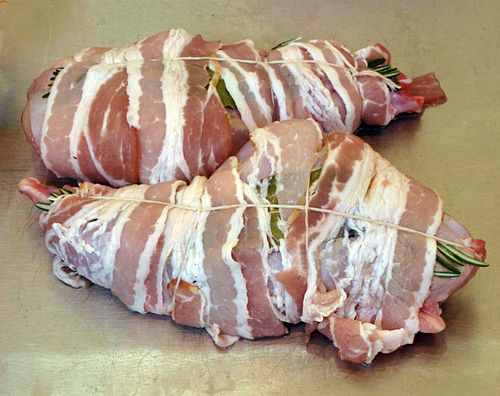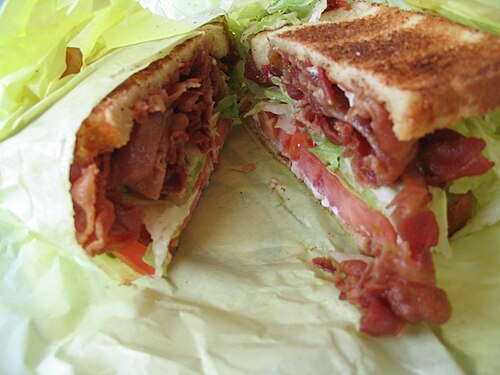Baconnoun
Cured meat from the sides, belly, or back of a pig.
Baconnoun
Thin slices of the above in long strips.
Baconnoun
The police.
Baconnoun
Road rash.
Baconnoun
The back and sides of a pig salted and smoked; formerly, the flesh of a pig salted or fresh.
Bacon
Roger Bacon. A celebrated English philosopher of the thirteenth century. Born at or near Ilchester, Somersetshire, about 1214: died probably at Oxford in 1294. He is credited with a recognition of the importance of experiment in answering questions about the natural world, recognized the potential importance of gunpowder and explosives generally, and wrote comments about several of the physical sciences that anticipated facts proven by experiment only much later.
Bacon
Francis Bacon. A celebrated English philosopher, jurist, and statesman, son of Sir Nicholas Bacon. Born at York House, London, Jan. 22, 1561: died at Highgate, April 9, 1626, created Baron Verulam July 12, 1618, and Viscount St. Albans Jan. 27, 1621: commonly, but incorrectly, called Lord Bacon. He studied at Trinity College, Cambridge, April, 1573, to March, 1575, and at Gray's Inn 1575; became attached to the embassy of Sir Amias Paulet in France in 1576; was admitted to the bar in 1582; entered Parliament in 1584; was knighted in 1603; became solicitor-general in 1607, and attorney-general in 1613; was made a privy councilor in 1616, lord keeper in 1617, and lord chancellor in 1618; and was tried in 1621 for bribery, condemned, fined, and removed from office. A notable incident of his career was his connection with the Earl of Essex, which began in July, 1591, remained an intimate friendship until the fall of Essex (1600-01), and ended in Bacon's active efforts to secure the conviction of the earl for treason. (See Essex.) His great fame rests upon his services as a reformer of the methods of scientific investigation; and though his relation to the progress of knowledge has been exaggerated and misunderstood, his reputation as one of the chief founders of modern inductive science is well grounded. His chief works are the "Advancement of Learning," published in English as "The Two Books of Francis Bacon of the Proficience and Advancement of Learning Divine and Human," in 1605; the "Novum organum sive indicia vera de interpretatione naturae," published in Latin, 1620, as a "second part" of the (incomplete) "Instauratio magna"; the "De dignitate et augmentis scientiarum," published in Latin in 1623; "Historia Ventorum" (1622), "Historia Vitae et Mortis" (1623), "Historia Densi et Rari" (posthumously, 1658), "Sylva Sylvarum" (posthumously, 1627), "New Atlantis," "Essays" (1597, 1612, 1625), "De Sapientia Veterum" (1609), "Apothegms New and Old," "History of Henry VII." (1622). Works edited by Ellis, Spedding, and Heath (7 vols. 1857); Life by Spedding (7 vols. 1861, 2 vols. 1878). See Shakspere.
Baconnoun
back and sides of a hog salted and dried or smoked; usually sliced thin and fried
Baconnoun
English scientist and Franciscan monk who stressed the importance of experimentation; first showed that air is required for combustion and first used lenses to correct vision (1220-1292)
Baconnoun
English statesman and philosopher; precursor of British empiricism; advocated inductive reasoning (1561-1626)
Bacon
Bacon is a type of salt-cured pork made from various cuts, typically from the pork belly or from the less fatty back cuts. It is eaten on its own, as a side dish (particularly in breakfasts), or used as a minor ingredient to flavour dishes (e.g., the club sandwich).
Basonnoun
(obsolete) basin
Basonnoun
A basin.
Bason
Bason is a surname.

























